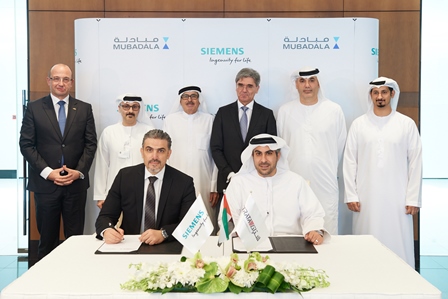Siemens AG, Strata Manufacturing and Etihad Airways have announced a collaboration project to develop the first 3D-printed parts for aircraft interiors in the Middle East and North Africa.
The partnership aims to revolutionise the aerospace industry, leveraging additive manufacturing, known as 3D printing, to help airlines to improve their designs, including making complex parts on demand and manufacturing discontinued parts.
Under the partnership, a pilot project will develop 3D printing solutions for aircraft cabin interior products for Etihad, the UAE’s national carrier.
According to the three companies involved, these will be the first 3D-printed aviation parts designed, manufactured and certified in the UAE, Middle East and the entire Asian world.
Siemens will leverage its global expertise in digitalisation and 3D printing to consult on the selection of materials, testing and the preparation of processes. The design team of Etihad Airways Engineering will work to certify the parts, and Strata will manufacture the parts in its factory.
Leveraging the success of the pilot project, Siemens and Strata expect to investigate the development of a strategic three-year joint roadmap for the further industrialisation of additive manufacturing in the UAE, the wider Middle East and North Africa. The roadmap will include training and the development of UAE citizens with the required skills for further deployment of 3D printing technology.
Etihad sees huge potential for 3D printing technology in aviation over conventional manufacturing methods, enabling faster on-demand production of complex parts and discontinued parts, and making design improvements by airlines very feasible.
“The biggest challenge for the use of flying 3D-printed parts in aviation is certification and we are ready to tackle it and make it a reality,” said Jeff Wilkinson, Etihad Airways Engineering CEO. “Etihad Airways Engineering will be using its expertise and major design certification approval (Design Organisation Approval – Part 21J) to design and certify the first 3D-printed part for aircraft cabin in the UAE. We will be partnering with the certification authority and with Strata to make certified 3D printing for aviation in the UAE a reality,” he said.
Siemens has been an active user of additive manufacturing since 1989, and offers an end-to-end portfolio for 3D printing that combines automation and digitalisation.
“We see great opportunities for 3D printing as a disruptive force in manufacturing, and expect it to play a key role in a globally competitive, increasingly digitalised industrial landscape in the Middle East,” said Assem Khalaili, Executive Vice President, Industry Customer Services, at Siemens Middle East. “This is highly relevant technology for the region’s development of an increasingly digitalised and diversified economic landscape, across a wide range of sectors. We are proud to be working with Strata and Etihad to advance 3D printing and strengthen local manufacturing here in the region.”
Strata will explore 3D printing technology for a range of applications to aid its manufacturing processes in aerostructures in areas such as tooling, fixtures and consumables using metallic and non-metallic materials. Badr Al-Olama, CEO of Strata and head of the Global Manufacturing and Industrialisation Summit Organising Committee, said 3D printing has the potential to revolutionise aerospace manufacturing.
“Strata is proud to facilitate the application of 3D printing technology in the aerospace field in the UAE for our national carrier Etihad, through our partnership with Siemens. Our goal is to deploy this technology on practical applications that will allow development of local knowledge building in various aspects of this technology that will lead to future innovations that can benefit the broader aerospace industry,” said Al-Olama.
The announcement of the partnership comes as Abu Dhabi, the UAE’s capital city, prepares to host the Global Manufacturing and Industrialisation Summit held recently.





